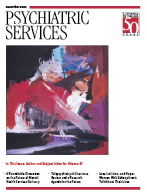Informed Consent and Neuroanatomic Correlates of Intentionality and Voluntariness Among Psychiatric Patients
Abstract
The authors examine the less-studied components of patients' autonomous decision making, or decisional autonomy, in the light of current research in psychiatry and neuropsychology and developments in the construct of informed consent. The three components of decisional autonomy—understanding, intentionality, and noncontrol or voluntariness—are related to clinical constructs in psychiatry and neuropsychology, in particular to executive control functions. The authors review studies that examine deficits in prefrontal cerebral function in schizophrenia, depression, and some anxiety disorders that are related to intentionality and voluntariness. Assessment of decisional autonomy should encompass evaluation of impaired intentionality and voluntariness, not simply impaired understanding. The main response to finding such impairments should be to provide treatment to ameliorate them. New strategies for psychiatric care should be developed to address the clinical challenges of an increasingly complex view of decisional autonomy.



